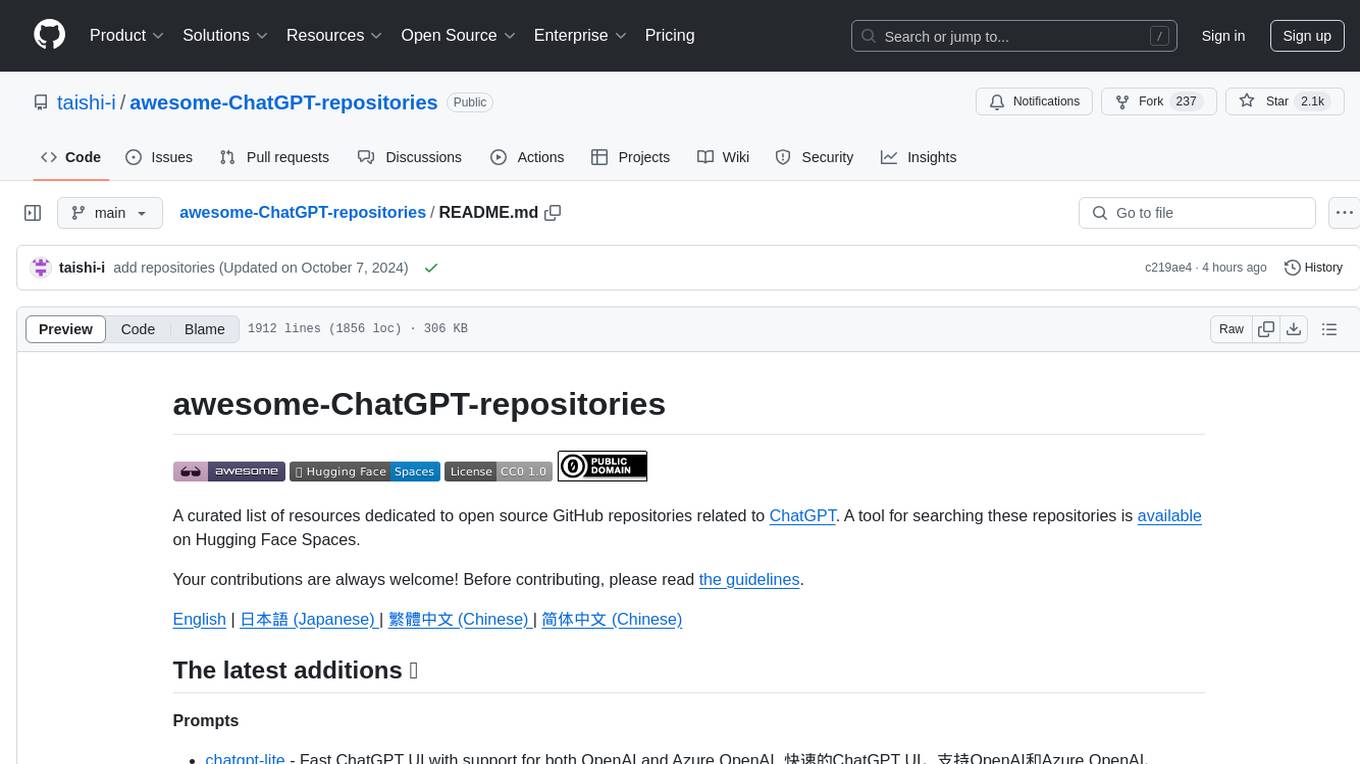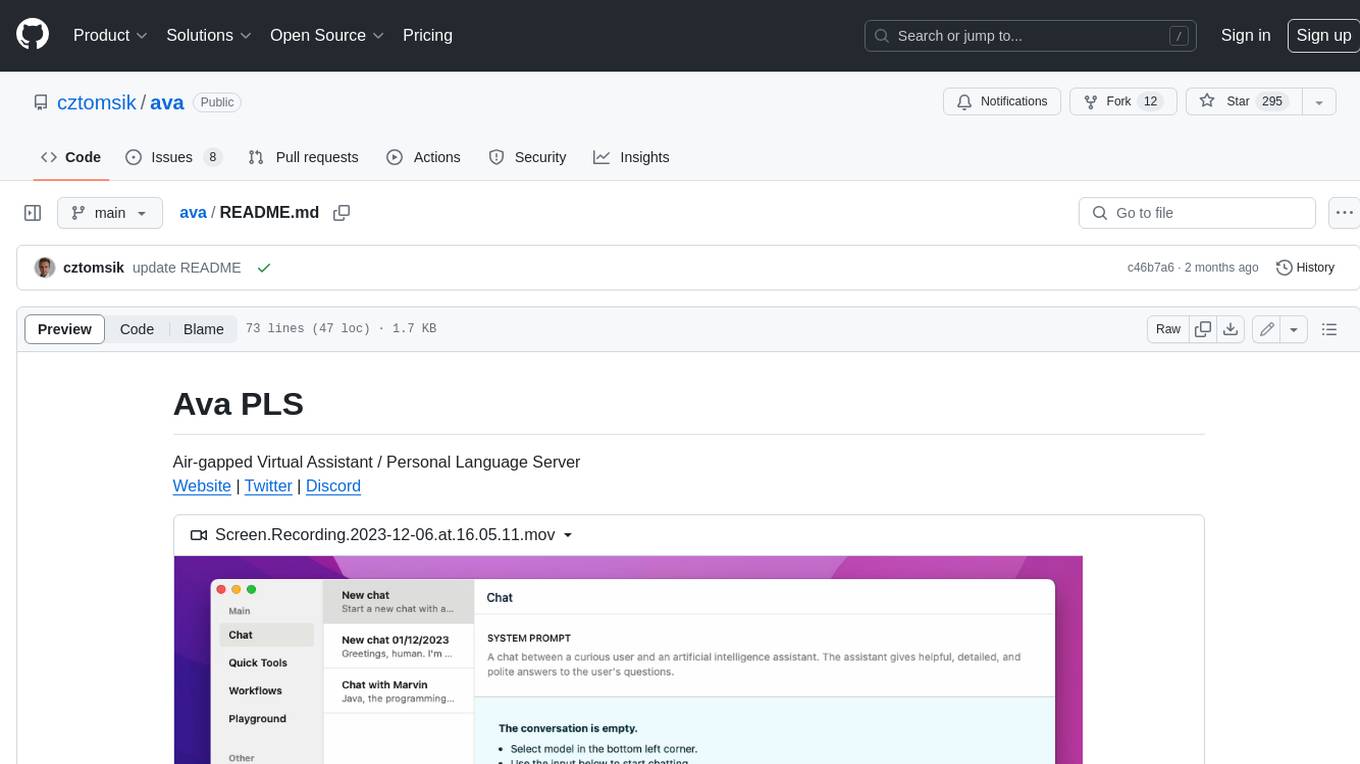
awesome-ai-devtools
Curated list of AI-powered developer tools.
Stars: 3553
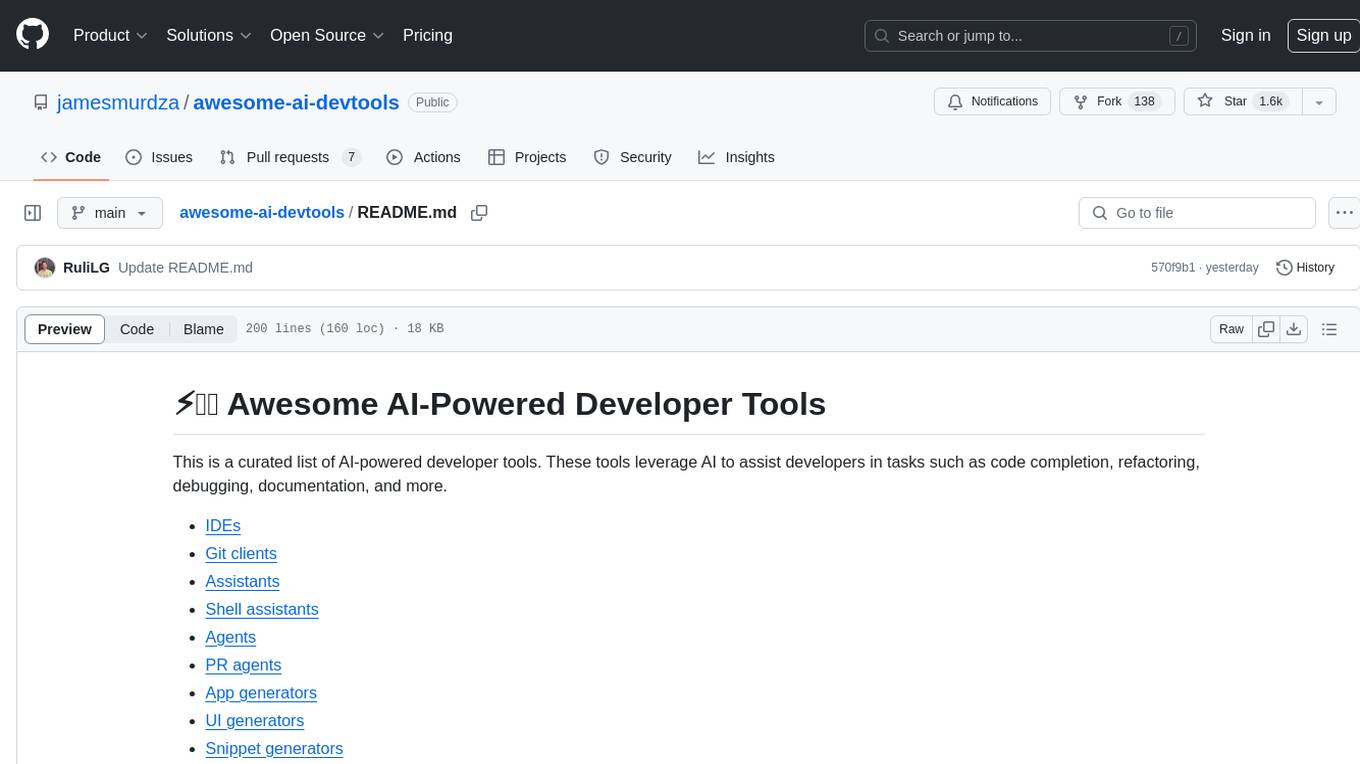
Awesome AI-Powered Developer Tools is a curated list of AI-powered developer tools that leverage AI to assist developers in tasks such as code completion, refactoring, debugging, documentation, and more. The repository includes a wide range of tools, from IDEs and Git clients to assistants, agents, app generators, UI generators, snippet generators, documentation tools, code generation tools, agent platforms, OpenAI plugins, search tools, and testing tools. These tools are designed to enhance developer productivity and streamline various development tasks by integrating AI capabilities.
README:
This is a curated list of AI-powered developer tools. These tools leverage AI to assist developers in tasks such as code completion, refactoring, debugging, documentation, and more.
- IDEs
- Git Clients
- Assistants
- Shell assistants
- Agents
- PR agents
- App generators
- UI generators
- Snippet generators
- Documentation
- OpenAI plugins
- Search
- Testing
- Evaluation
- Resources
- Google Antigravity — An agent-first IDE that orchestrates autonomous AI agents to plan, execute, and verify complex coding tasks with deep browser integration.
- Crystal — A new type of dev environment to manage, inspect, and test parallel Claude Code sessions.
- Cursor — An IDE with chat, edit, generate and debug features. Forked from VSCodium, so the interface is similar to VS Code. Uses OpenAI.
- PearAI — An open source fork of VS Code with chat and inline code generation.
- Melty — An open source fork of VS Code with built in chat, change previews, and ability to write commits with AI. Currently only source code is available.
- Replit — Web-based IDE with cloud developer environments, code completion, chat, a software development agent and deployments.
- Mutable — Web-based IDE, integrated with a chatbot and GitHub.
- CodeStory — An IDE with chat, code explanations, auto-generated commits and PR summaries. Forked from VSCodium.
- UI Pilot — Chat-based AI code editor that creates forms using Material UI, using GPT-4.
- GitWit — Web-based editor for building ReactJS applications with AI.
- Windsurf — An IDE with chat, edit, generate and debug features. Forked from VSCodium, so the interface is similar to VS Code. Formerly known as Codeium.
- Theia IDE — An extensible open-source IDE (web and desktop) providing AI-powered features like chat, code completion, terminal assistance and custom agents using arbitrary LLMs. Built on Theia AI, a platform designed to enable the creation of custom, AI-powered tools and IDEs.
- OneCompiler — A free AI Powered online compiler supporting over 70 languages, including Java, Python, MySQL, C++, and HTML, for writing, running, and sharing code.
- trae — Trae is an adaptive AI IDE that transforms how you work, collaborating with you to run faster.
- Zed - A high-performance, multiplayer code editor from the creators of Atom and Tree-sitter.
- GitBrain — Git client that simplifies the git workflow. Splits code changes, generates summaries & commit messages for code changes. Uses OpenAI.
- GitButler — Git client for simultaneous branches on top of your existing workflow. Defaults to OpenAI, can be changed to Perplexity for generating conventional commit messages.
- AI Git Narrator - CLI tool that uses AI to automatically generate high-quality Git commit messages and pull request descriptions.
- Replit Ghostwriter Chat — Assistant built into Replit with chat, proactive debugging, and autocomplete. Uses OpenAI for chat and replit-code-v1-3b (OS) for autocomplete.
- Unblocked — Augment source code with relevant existing knowledge in GitHub, Slack, Jira, Confluence, and more. Get answers through chat and IDE file-level context. Available on web, macOS, Slack, VSCode, and JetBrains IDE's.
- Sourcegraph Cody — Assistant with chat, refactoring, and unit test generation. Extensions for VS Code and IntelliJ. Also available as a web app.
- Magnet — Web-based chatbot with repositories and issues as context.
- Adrenaline — Web-based chatbot using AI and ASTs to answer questions about your codebase.
- CodeSquire — Chrome extension that adds autocomplete to Google Colab, BigQuery, and JupyterLab.
- Incognito Pilot — Open source assistant with built-in Python editor and interpreter.
- Onboard — Chat with an AI about public and private codebases.
- Code to Flow — Visualize, analyze, and understand code with interactive flowcharts.
- Pieces — An on-device copilot that helps you capture, enrich, and reuse code, streamline collaboration, and solve complex problems through a contextual understanding of your workflow.
- Wren AI — SQL AI Agent to get results and insights faster by asking questions without writing SQL, and it's open-source!
- TEXT2SQL.AI — AI-powered SQL query builder. Translate, explain and fix complex SQL queries using plain English.
- SQLAI.ai — AI generates, fixes, explains and optimizes SQL queries. Ability to add your own database schema and train AI to understand it.
- CodeWP — AI chat and coding tools specifically trained for WordPress developers. AI code generation for code snippets and plugins in WordPress.
- Gru.ai — An AI developer can help you solve technical problems and tackle daily coding tasks, such as building algorithms, debug issues, test solutions, answer programming questions, etc.
- GitHub Copilot — A VS Code extension with chat, pull request text generation, and unit test generation.
- Cline — Autonomous coding agent for VS Code that can create/edit files, execute commands, and use the browser with user permission. Supports multiple AI providers including OpenRouter, Anthropic, OpenAI, Google Gemini, AWS Bedrock, Azure, and GCP Vertex.
- Refact AI Source — Open source assistant with chat, completion, refactoring, and codebase-specific fine-tuning. Extensions for VS Code and JetBrains.
- Continue — VS Code extension with chat, refactor, and code generation. Edits multiple files and runs commands on your behalf.
- Blackbox AI — VS Code extension with autocomplete and chat including links to online coding references.
- CodeGeeX — Open source assistant based on the CodeGeeX LLM with chat, completion, and refactoring. Extensions for 9 editors including VS Code, and PyCharm.
- Quack AI — VS Code extension for adhering to project coding guidelines.
- Tabby — Open source, self-hosted code completion assistant. Extensions for VS Code and Vim.
- Tabnine (Source) — Open source, self-hosted code completion assistant. Extensions for 15 editors including VS Code, IntelliJ, Neovim, Eclipse, and PyCharm.
- CodeMate — VS Code extension for debugging and optimizing code.
- AskCodi — AI coding assistant with extensions for VS Code, JetBrains and Sublime Text.
- Rubberduck — Open source, chat assistant for the Visual Studio Code side bar.
- CodeComplete — Self hosted, enterprise completion assistant.
- GoCodeo - GoCodeo is an AI agent that lets you build and deploy full-stack apps effortlessly, with one click Vercel deployment and seamless Supabase integration.
- JetBrains AI — AI assistant available in all JetBrains IDEs.
- aiXcoder — Local or cloud-based assistant with extensions for IntelliJ IDEA, CLion, GoLand, PyCharm, WebStorm, Visual Studio Code, and Eclipse.
- Sourcery — AI assistant and linter with a reference of 160 Python best practices and 40+ JS/TS best practices. Extensions for VS Code, PyCharm, vim and Sublime.
- Swimm — Assistant for contextual code understanding using static analysis and AI generated documentation. VSCode, Jetbrains, IntelliJ, WebStorm, Rider, PhpStorm, Android Studio, PyCharm, PhPStorm
- Supermaven — VS Code extension for autocomplete with 300,000-token context window.
- Amazon Q Developer — AI coding assistant with extensions for IDEs such as VS Code and IntelliJ IDEA. Amazon Q Developer IDE plugin has a number of Agents that can also scan code to highlight and define security issues (/review), write documentation (/doc), write unit tests (/test), and help you upgrade to later versions of Java (/transform) (formerly known as Amazon CodeWhisperer)
- Android Studio Bot — Studio Bot is an AI powered coding assistant that is tightly integrated in Android Studio. Studio Bot can help Android developers generate code, find relevant resources, learn best practices, and save time.
- IBM watsonx Code Assistant for Z — watsonx Code Assistant for Z is an AI-powered mainframe application modernization product with code generation. Features include application discovery and analysis, automated code refactoring and COBOL to Java conversion.
- EasyCode — VS Code extension with GPT-4 chat.
- Kilo Code - Open Source AI coding assistant for planning, building, and fixing code inside VS Code.
- FlyonUI MCP — Integrate FlyonUI MCP - Tailwind AI Builder directly into your IDE and craft stunning Tailwind CSS Components, Blocks and Pages inspired by FlyonUI.
- Traycer - Plan-First Coding Assistant in VS Code.
- shadcn/studio MCP - Integrate shadcn/studio MCP Server directly into your favorite IDE and craft stunning shadcn/ui Components, Blocks and Pages inspired by shadcn/studio.
- Amazon Q Developer CLI - CLI that provides command completion, command translation using generative AI to translate intent to commands, and a full agentic chat interface with context management that helps you write code. It works with many terminals and shells, on MacOS, Linux and Windows (via wsl).
- aloc — A modern, AI-augmented lines of code counter built with Rust and Ratatui. Uses AI effort profiles for accurate project estimation.
- talk-codebase — CLI chatbot with repository as context. Supports OpenAI as well as locally running LLMs via GPT4All.
- gptcomet — CLI tool to help you generate commit message and review changes. Support mutiple providers and languages.
- poorcoder — A collection of Bash scripts to extract code context, apply changes from markdown, and generate AI commit messages while using web-based LLMs.
- Vibe Compiler (vibec) — A self-compiling tool that transforms markdown-based prompt stacks into code and tests using LLM generation. Works with any LLM via OpenRouter, including Claude, ChatGPT, and Grok.
-
cmd-ai - Turns natural language into executable shell commands (ei.:
ai Tell me the free space on disk) - promptext — Smart code context extractor for AI assistants with accurate token counting, relevance prioritization, and budget management. Prepares optimized code context within LLM token limits.
- Conduit8 — CLI registry for discovering, installing, and managing Claude Code skills. Search 20+ curated skills by keyword or category, install directly to ~/.claude/skills/ with one command.
- Baz CLI - CLI for AI assisted code review, with access to the actual code, diff etc.
- AdaL — Self-evolving AI coding agent that lets models collaborate (Claude, GPT, Gemini). Runs locally, learns your codebase patterns.
- Tokscale — CLI tool for tracking token usage from AI coding agents (OpenCode, Claude Code, OpenClaw, Codex, Gemini CLI, Cursor IDE, AmpCode, Factory Droid) with a global leaderboard and 2D/3D contribution graphs.
- vsync — CLI tool that syncs Skills, MCP servers, Agents & Commands across Claude Code, Cursor, OpenCode, and Codex with automatic format conversion (JSON ↔ TOML ↔ JSONC).
- Arctic: A terminal-first TUI that unifies multiple AI coding plans and APIs with built-in usage and quota visibility.
- Memex — Build anything in any stack, with just natural language, on your desktop.
- Pieces — AI-enabled desktop application and browser extension designed to assist developers in enhancing productivity.
- AskCommand — Web based tool to generate Unix commands from text automatically using AI.
- Butterfish — CLI tool that embeds ChatGPT in your shell for easy access. Includes simple agentic capabilities.
- Shell Whiz — highly configurable CLI assistant to generate shell commands and get explanations for them.
- GitFluence — Web-based Git command generator to automatically generate Git commands for terminal or CLI from text description, using an AI-driven solution to suggest the most relevant Git commands.
- AutoComplete.sh - CLI tool that adds AI-powered command-line suggestions directly to your terminal with just type to return the top suggestions for you.
- code-collator — CLI tool that creates a single markdown file that describes your entire codebase to language models. Useful for AI-coding assistance from the Claude/ChatGPT web interface rather than via the API.
- Warp - Warp brings AI and team knowledge together in a single, fast, and intuitive terminal.
- TmuxAI - AI-powered, non-intrusive terminal assistant.
- intelli-shell - Manage command templates/snippets with dynamic completions and AI integration.
- Smol Developer — CLI agent that generates a repository from a prompt. Uses OpenAI and Anthropic.
- Aider — CLI assistant and agent that generates changes and commits to repositories. Uses OpenAI.
- Blinky — A debugging agent for VS Code that helps to identify and fix backend errors, inspired by SWE-agent.
- Mentat — CLI assistant and agent that makes changes to repositories.
- GPT Engineer — CLI agent that generates a repository from a prompt, and asks clarifying questions.
- GPT Migrate — CLI agent that converts a full-stack application from one language or framework to another. Uses GPT-4 32k context.
- Grit — GitHub-integrated agent for automating maintenance tasks and other development work.
- DemoGPT — Auto Gen-AI App Generator with the Power of Llama 2
- DevOpsGPT — DevOpsGPT: AI-Driven Software Development Automation Solution
- Second.dev — A platform for adding features to full-stack apps.
- Factory — Agents for code generation. Waitlisted.
- sudocode — A web based chat assistant for generating projects, similar to Code Interpreter.
- CodeFlash AI — A CLI and CI tool for optimizing Python code using AI.
- Micro Agent by Builder — An AI agent that writes and fixes code for you.
- Fine — AI Dev Environment for automating mundane work. Integrate GitHub, Sentry, Linear. Get context-aware answers to questions. Plan, design and implement changes. Automate self-healing CI/CD.
- Potpie — Open Source AI Agents for your codebase in minutes. Use pre-built agents for Q&A, Testing, Debugging and System Design or create your own purpose-built agents.
- Roundtable MCP Server — Zero-configuration MCP server that unifies multiple AI coding assistants through intelligent auto-discovery and standardized interface
- Claude Code - Anthropic's agentic coding tool.
- Open Agent — Self-hosted control plane for Claude Code with isolated container workspaces and real-time mission streaming.
- Agentic Sprint — Spec-driven, self-iterative multi-agent framework for Claude Code with coordinated specialized agents (Python, Next.js, CI/CD, QA, UI Testing).
- Leap.new - It builds functional apps with real backend services, APIs, and deploys to your cloud.
- Recurse ML - Find bugs in AI Generated Code
- Zenable — AI guardrails that learn your team's standards and ensure coding agents follow them, maximizing speed and quality.
- Trellis - All-in-one AI framework & toolkit for Claude Code & Cursor. Manages tasks, specs, and multi-agent pipelines.
- Greptile — AI bot that reviews PRs in GitHub/Gitlab with full context of the codebase.
- Macroscope - AI-powered code review for GitHub that uses ASTs to build a graph-based representation of your codebase & pulls context from your issue management systems.
- EntelligenceAI — AI powered code reviews for Github and Gitlab that improves over time based on user comments
- Sweep — AI junior dev: GitHub integration to generate, test, and self-review pull requests from issues.
- Codegen — GPT-4 based PR agent for enterprise codebases.
- Code Review GPT — An open source tool for reviewing PRs. Works as GitHub action, Gitlab CLI or locally.
- Qodo PR Agent — Open source tool for automated code reviews. Qodo was formerly known as Codium (not to be confused with Codeium with an "E").
- Nova — CI bot to add actions such as summaries and tests to new PRs.
- CodeRabbit — Customizable CI to add summaries and code suggestions to PRs.
- SwePT — Open source PR generator written in 150 lines of Python code.
- Duckie — A web based chat assistant for modifying GitHub repositories.
- PR Explainer Bot — A GitHub integration that adds explanatory text to newly created PRs.
- Goast — A hosted tool that ingests your error logs and suggests fixes.
- Corgea — A GitHub integration that finds and fixes vulnerable code.
- vx.dev — A GitHub integration focused on UI generation with built in support for shadcn, lucide, and nivo charts.
- Pixee — Pixeebot finds security and code quality issues in your code and creates merge-ready pull requests with recommended fixes.
- CodeAnt AI — Automatically create PRs to fix code issues.
- What The Diff — AI-powered app that reviews the diff of pull requests and writes a descriptive comment about the changes in plain english.
- Trag — AI powered code reviews with pre-defined instructions and patterns.
- CodeReviewBot — AI powered code reviews for GitHub
- Callstack.ai Code Reviewer — AI-powered PR reviewer for GitHub, designed to identify bugs, security issues, and performance bottlenecks.
- Matter AI - Open Source AI Code Reviewer to help engineering teams release code with confidence.
- Gito - AI code reviewer that works with any language model, locally or in GitHub Actions.
- Baz - Ai Code Reviewer that is tailored to your team's guidelines and conventions. Customizable, adaptable, responsive and integrated with the rest of teh developer tooling for context.
-
Pico — End-to-end micro app generator with instant deployment.
-
Co.dev — AI-powered app development platform that helps build and deploy full-stack applications.
-
SoftGen — AI-powered software generation platform for building Web Apps.
-
LlamaCoder — Open source code generation model for building applications using Opensource LLMs.
-
e2b_Fragments — Platform for building and deploying AI-powered applications with sandboxed environments.
-
Bolt.new — AI-powered web development agent that allows you to prompt, run, edit, and deploy full-stack applications directly in the browser using WebContainers. Supports npm packages, Node.js servers, and third-party APIs.
-
Bolt.diy — Open source version of Bolt.new that supports multiple LLM providers including Groq, Anthropic, Ollama, OpenRouter, Gemini, LMStudio, Mistral, xAI, HuggingFace, DeepSeek
-
Srcbook — TypeScript-centric app development platform with an AI app builder and TypeScript notebook.
-
Capacity — AI powered full-stack web app development that turn prompt in natural language into fully functional web applications.
-
Lovable — AI-powered full-stack app development platform that converts natural language descriptions or designs into fully functional applications with built-in deployment and GitHub integration.
-
Literally anything — HTML and JavaScript web app generator.
-
GPT Web App Generator — Generates a full-stack React/Node.js/Prisma/Wasp app from a short description.
-
Make Real — Online canvas that can be used to generate HTML/JavaScript apps.
-
Marblism — Generate a SaaS boilerplate from a prompt.
-
Glowbom — Generate apps with AI and export to multiple platforms.
-
Mage — Generate full-stack web apps in Wasp, React, Node.js and Prisma.
-
ScrollHub — Generate and publish websites using the Scroll programming language.
-
Berrry — Twitter app generator that transforms social media posts into functional web applications. Turn tweets and Reddit content into complete apps with unique subdomains.
-
Blank Space — Open-source AI app builder for creating web applications using natural language. Self-hostable alternative to v0, Lovable, and Bolt.
-
Fastshot — AI driven no-code platform for building and deploying mobile apps.
- v0 — Create and iterate new UI components in your browser.
- Rendition Create — Create and iterate new UI components in your browser.
- Rapidpages — Open source UI generator.
- Magic Patterns — Protoype your product ideas. UI generator website where you can prompt, upload images, or import design inspiration with their Chrome Extension. Can export to Figma with a plugin. Supports a number of component systems including Shadcn, ChakraUI, and HTML + Tailwind.
- Tempo — WYSIWYG editor for React interfaces.
- Kombai — AI Tool for generating frontend code from Figma.
- CodeParrot — VS code plugin to generate Frontend code from Figma. Reuses existing components, libraries and coding standards to generate code which fits perfectly with your existing codebase. All without any prompting.
- Galileo AI — A text-to-UI platform. Waitlist.
- Uizard — Generate multi-screen mockups from text prompts and edit them with a drag-and-drop editor. Scan screenshots of apps or hand-drawn wireframes and transform them into editable app mockups.
- Frontly — Convert the uploaded image to HTML CSS code.
- BoringUi — Create beautiful UI using your JSON data. The generated UI is in HTML and Tailwind CSS with code which can be copied and UI can be shared with anyone using links.
- Polymet — Create and iterate product design easily. Polymet helps teams create user interfaces and prototypes without any design experience, provides production-ready front-end code.
- CSS Picker - Copy UI from Existing Design and Iterate with AI, support Copy CSS from website (by CSS Picker Extension), image to code and text to UI.
- CodePal — A web tool for quickly generating or refactoring code.
- AI Code Convert — A web tool for translating code between programming languages.
- AI Code Playground — A web tool for refactoring and improving code.
- AutoRegex — AutoRegex uses OpenAI's GPT-3 to produce regular expressions from plain English.
- unpkg.ai — Open source AI-powered ESM module generation service. Generate JavaScript modules via URL for rapid prototyping.
- Trelent — A VS Code extension to generate docstrings. Uses proprietary models.
- DiagramGPT — DiagramGPT is a free AI-based web app that converts a schema, infrastructure definition, code snippet or plain language description into diagrams. The tool can generate flow charts, entity relationship diagrams, cloud architecture diagrams and sequence diagrams.
- DocuWriter.ai — AI-powered web app to generate automated Code & API documentation from your source code files.
- README-AI — Automated README.md file generator, powered by large language model APIs.
- Supacodes — An AI tool that automates writing & updating code documentation in Github
- CodexAtlas — Automated code and API documentation using latest AI models
- TraceRoot AI - An AI native observability tool that using AI agents to automatically fix your production bugs.
- ChatWithGit — Enables ChatGPT to search GitHub and return links to relevant repositories.
- Code ChatGPT Plugin — Open source example of a ChatGPT plugin that pulls context from a directory of files.
- Bloop — Natural language search for repositories.
- Buildt — Natural language search for repositories. Waitlist.
- SeaGOAT — A local search tool leveraging vector embeddings to search your codebase semantically.
- ContextMCP — Self-hosted semantic search across documentation from various sources for AI agents.
-
Checksum AI — End-to-end fully autonomous QA Automation agent that generates CI/CD ready Playwright tests directly to the repository
-
OctoMind — Auto-maintenance and generated browser-based end-to-end-tests integrated into Github Actions, Azure DevOps and more.
-
Traceloop — Uses OpenTelemetry tracing data with generative AI to improve system reliability.
-
Carbonate — End-to-end testing using natural language. Integrates into your existing test suite (currently Jest, PHPUnit and Python's unittest).
-
Meticulous.ai — Automatically generated, automatically maintained end-to-end tests: as your app evolves so does your test suite.
-
DiffBlue — Automatically generated unit tests for Java.
-
Qodo — Non-trivial test generation with support for major programming languages. Extensions for VS Code and JetBrains. (formerly Codium)
-
DeepUnit — Thoughtful test cases and generation of complete unit test files. Available as an interactive VS Code extension, npm package, CLI or CI/CD pipeline.
-
MutahunterAI — Accelerate developer productivity and code security by finding vulnerabilities in code and generating tests for them. Open Source and available as a CLI or CI/CD pipeline.
-
KushoAI — AI agent for API testing which transforms your Postman collections, OpenAPI specs, curl commands, etc. into exhaustive test suites that plug into your CI/CD pipeline.
-
Test Gru — Provides enterprise-level unit test automation services.
-
AgentsKB - Expert knowledge layer for AI assistants. Your AI searches, we research. That's the difference.
- sniffbench — Benchmark suite for evaluating coding agents. Compare configurations, track metrics, and A/B test with real issues from your repos.
For Tasks:
Click tags to check more tools for each tasksFor Jobs:
Alternative AI tools for awesome-ai-devtools
Similar Open Source Tools

awesome-ai-devtools
Awesome AI-Powered Developer Tools is a curated list of AI-powered developer tools that leverage AI to assist developers in tasks such as code completion, refactoring, debugging, documentation, and more. The repository includes a wide range of tools, from IDEs and Git clients to assistants, agents, app generators, UI generators, snippet generators, documentation tools, code generation tools, agent platforms, OpenAI plugins, search tools, and testing tools. These tools are designed to enhance developer productivity and streamline various development tasks by integrating AI capabilities.
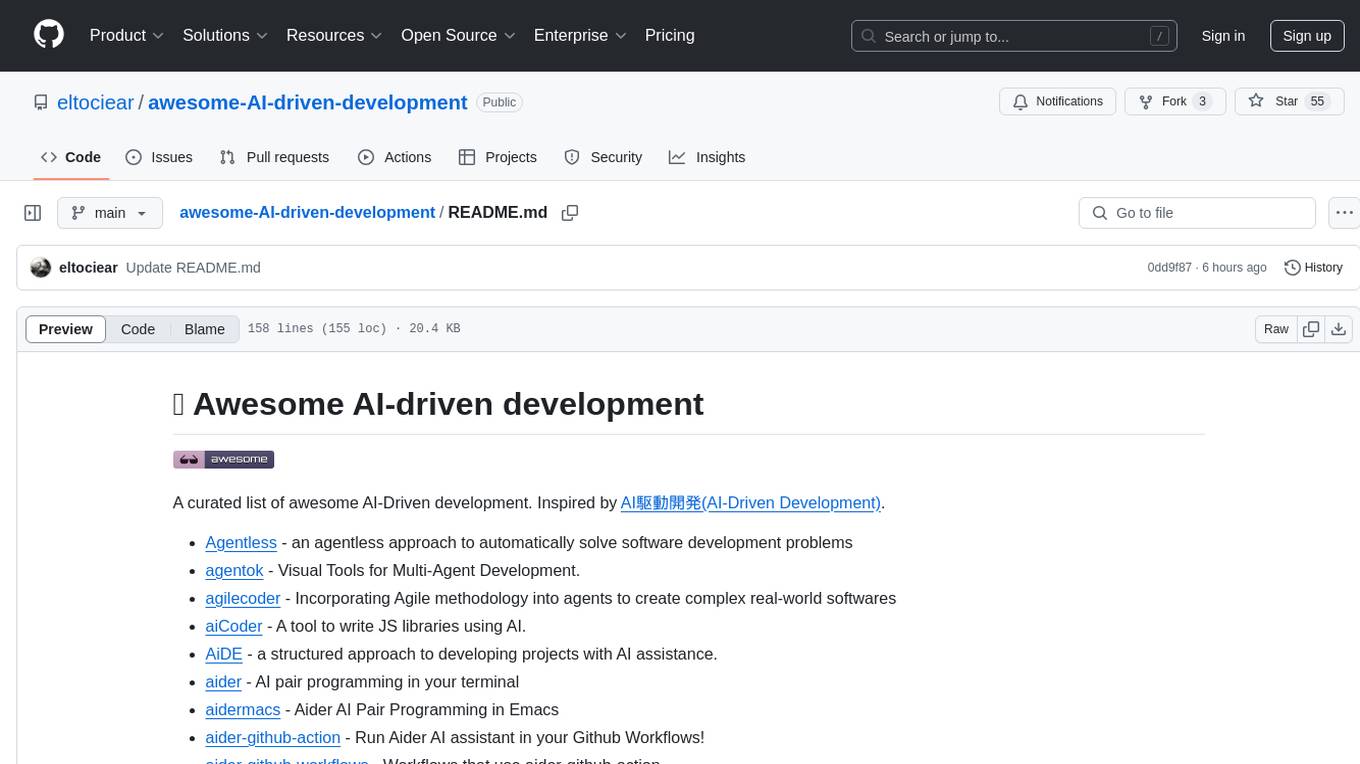
awesome-AI-driven-development
Awesome AI-Driven Development is a curated list of tools, frameworks, and resources for AI-driven development. It includes AI code editors, terminal-based coding agents, IDE plugins & extensions, multi-agent systems, code generation & templates, testing & quality assurance tools, Model Context Protocol implementations, pull request & code review tools, project management & documentation tools, language models for code, development workflows tools, code search & analysis tools, specialized tools for Git & version control, cloud & DevOps, language-specific tasks, terminal & shell utilities, prompt & context management tools, Copilot extensions & alternatives, learning & tutorials resources, and configuration & enhancement tools for AI coding assistants.

Genkit
Genkit is an open-source framework for building full-stack AI-powered applications, used in production by Google's Firebase. It provides SDKs for JavaScript/TypeScript (Stable), Go (Beta), and Python (Alpha) with unified interface for integrating AI models from providers like Google, OpenAI, Anthropic, Ollama. Rapidly build chatbots, automations, and recommendation systems using streamlined APIs for multimodal content, structured outputs, tool calling, and agentic workflows. Genkit simplifies AI integration with open-source SDK, unified APIs, and offers text and image generation, structured data generation, tool calling, prompt templating, persisted chat interfaces, AI workflows, and AI-powered data retrieval (RAG).
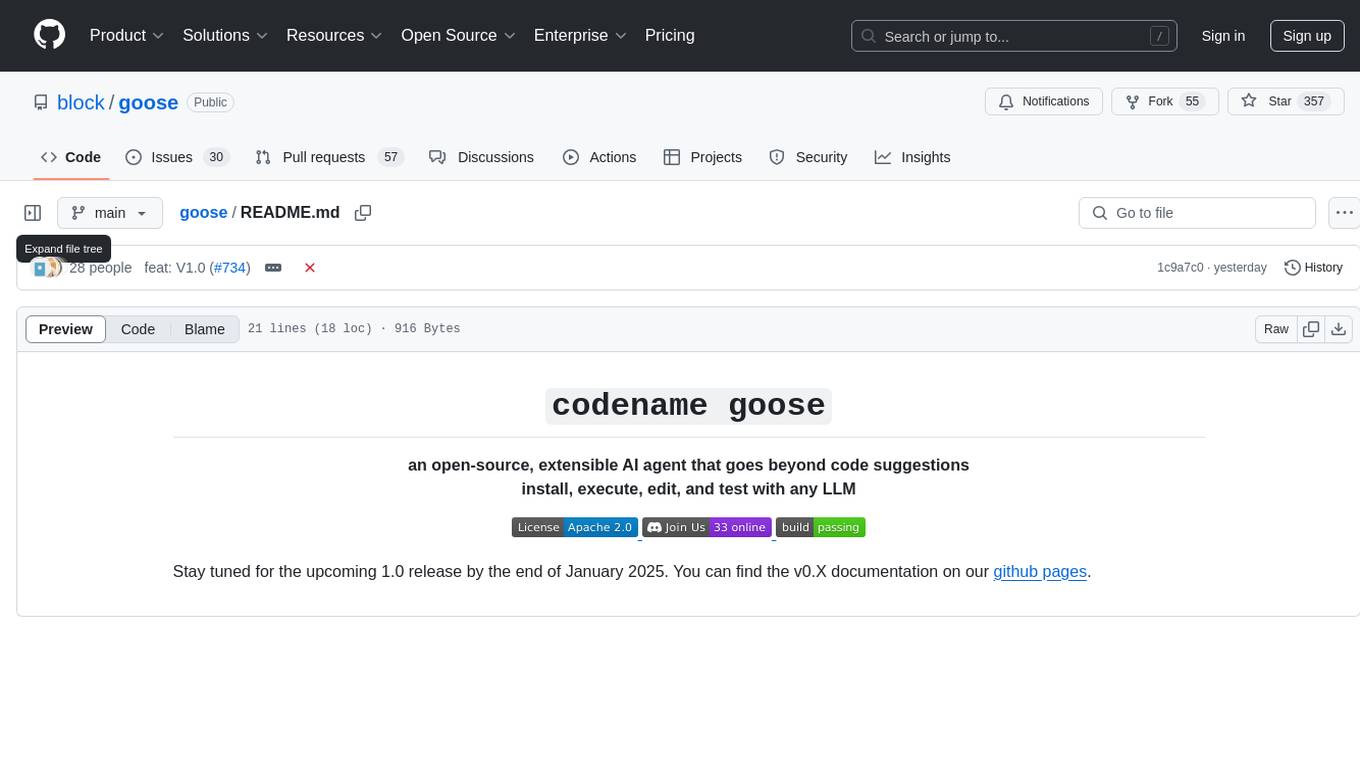
goose
Codename Goose is an open-source, extensible AI agent designed to provide functionalities beyond code suggestions. Users can install, execute, edit, and test with any LLM. The tool aims to enhance the coding experience by offering advanced features and capabilities. Stay updated for the upcoming 1.0 release scheduled by the end of January 2025. Explore the v0.X documentation available on the project's GitHub pages.
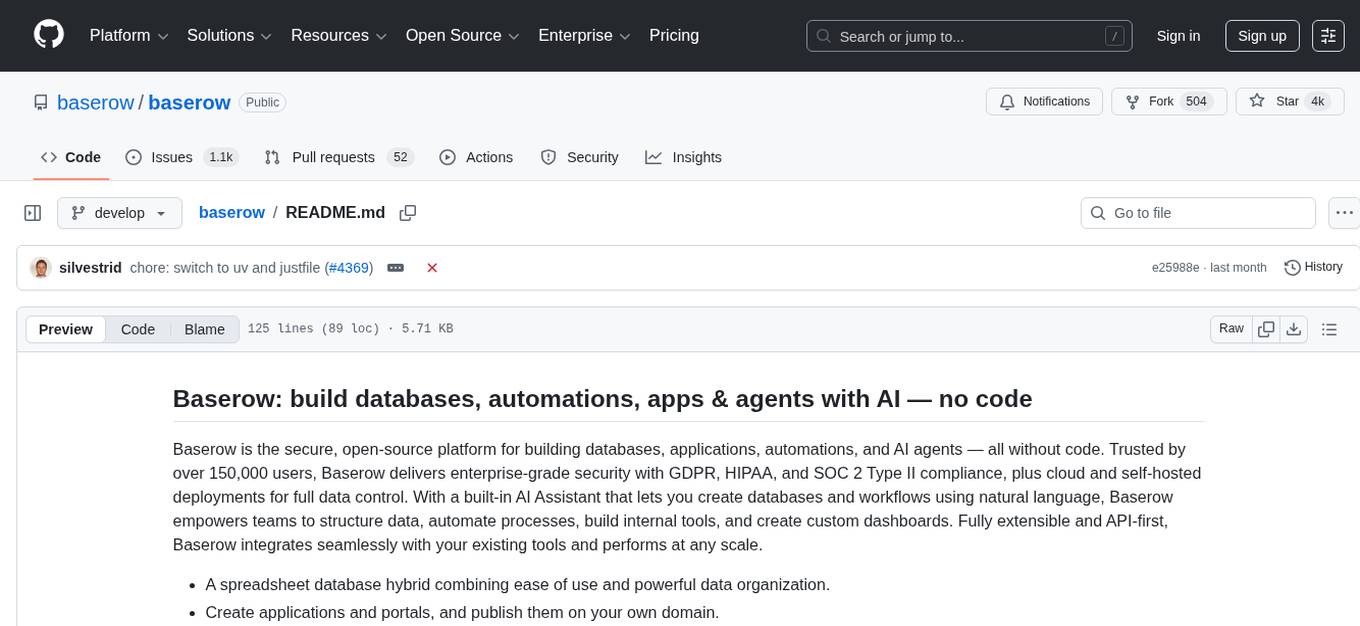
baserow
Baserow is a secure, open-source platform that allows users to build databases, applications, automations, and AI agents without writing any code. With enterprise-grade security compliance and both cloud and self-hosted deployment options, Baserow empowers teams to structure data, automate processes, create internal tools, and build custom dashboards. It features a spreadsheet database hybrid, AI Assistant for natural language database creation, GDPR, HIPAA, and SOC 2 Type II compliance, and seamless integration with existing tools. Baserow is API-first, extensible, and uses frameworks like Django, Vue.js, and PostgreSQL.
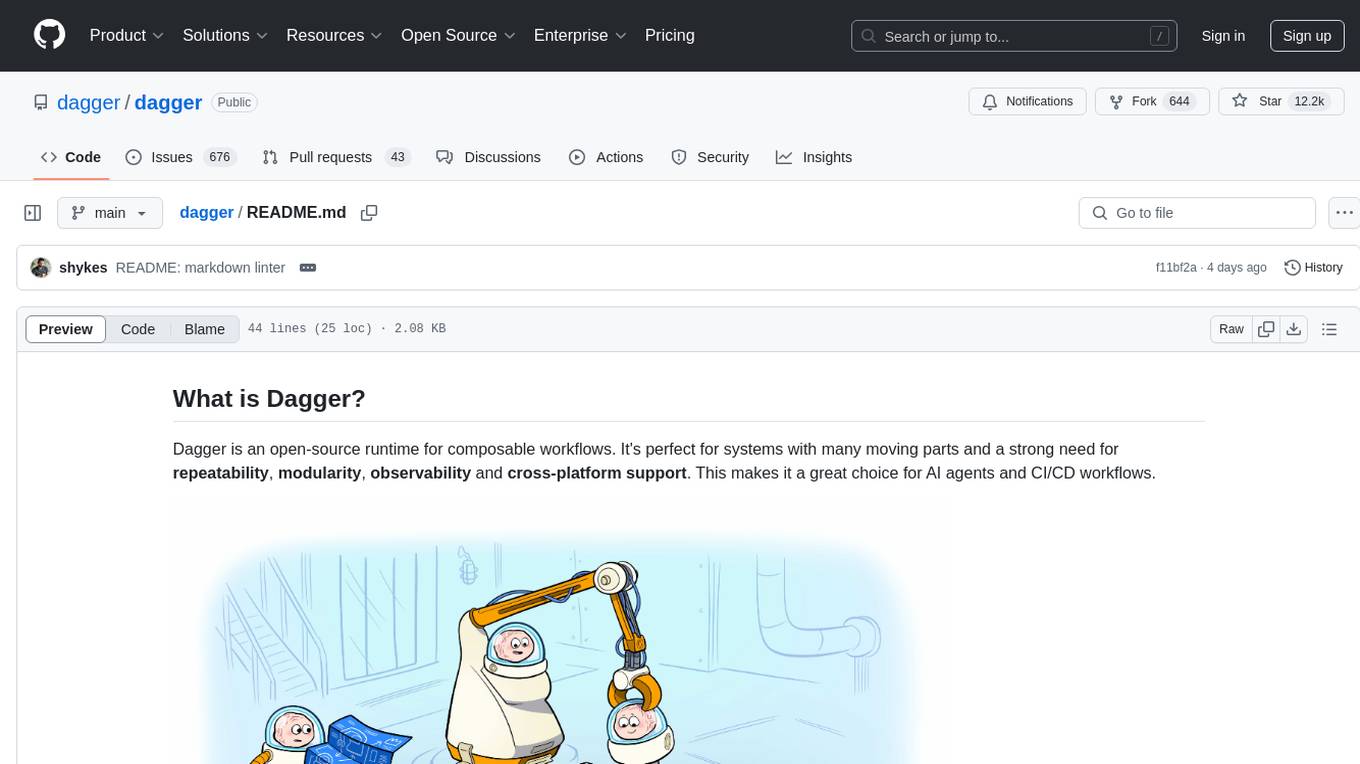
dagger
Dagger is an open-source runtime for composable workflows, ideal for systems requiring repeatability, modularity, observability, and cross-platform support. It features a reproducible execution engine, a universal type system, a powerful data layer, native SDKs for multiple languages, an open ecosystem, an interactive command-line environment, batteries-included observability, and seamless integration with various platforms and frameworks. It also offers LLM augmentation for connecting to LLM endpoints. Dagger is suitable for AI agents and CI/CD workflows.
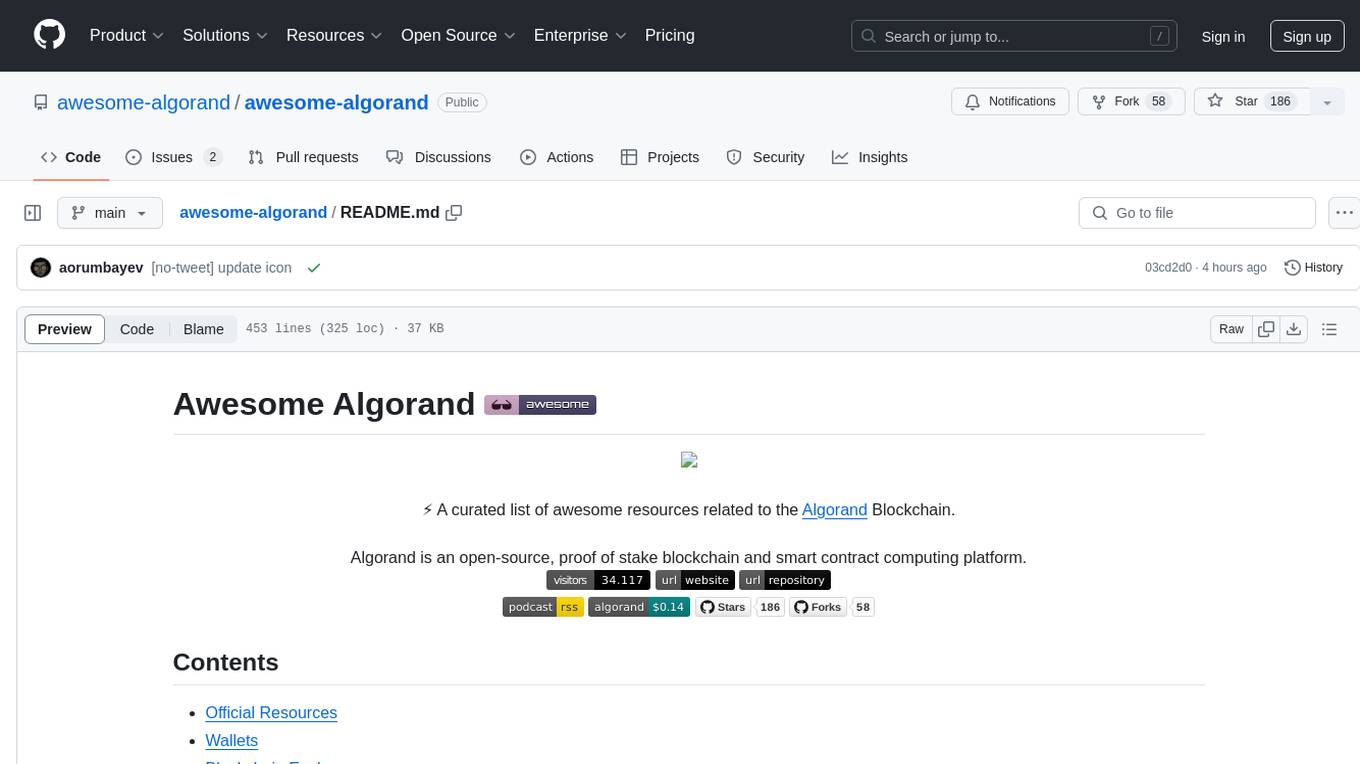
awesome-algorand
Awesome Algorand is a curated list of resources related to the Algorand Blockchain, including official resources, wallets, blockchain explorers, portfolio trackers, learning resources, development tools, DeFi platforms, nodes & consensus participation, subscription management, security auditing services, blockchain bridges, oracles, name services, community resources, Algorand Request for Comments, metrics and analytics services, decentralized voting tools, and NFT marketplaces. The repository provides a comprehensive collection of tools, tutorials, protocols, and platforms for developers, users, and enthusiasts interested in the Algorand ecosystem.
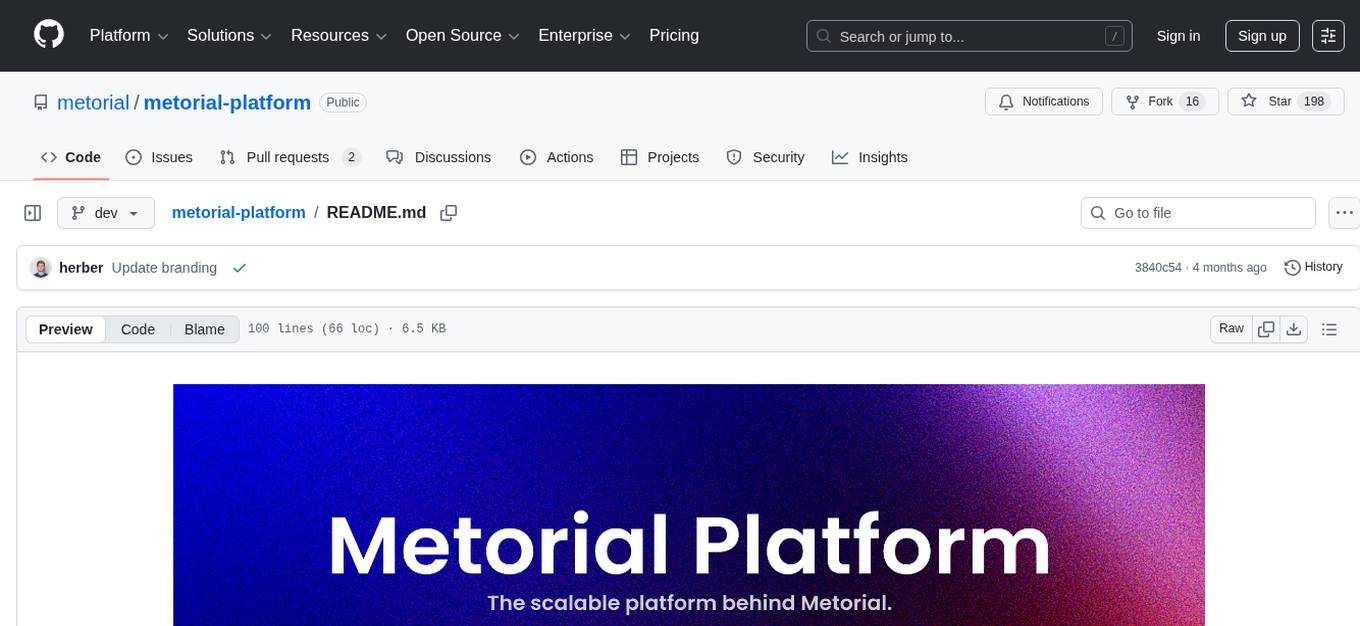
metorial-platform
Metorial Platform is an open source integration platform designed for developers to easily connect their AI applications to external data sources, APIs, and tools. It provides one-liner SDKs for JavaScript/TypeScript and Python, is powered by the Model Context Protocol (MCP), and offers features like self-hosting, large server catalog, embedded MCP Explorer, monitoring and debugging capabilities. The platform is built to scale for enterprise-grade applications and offers customizable options, open-source flexibility, multi-instance support, powerful SDKs, detailed documentation, full API access, and an advanced dashboard for managing integrations.
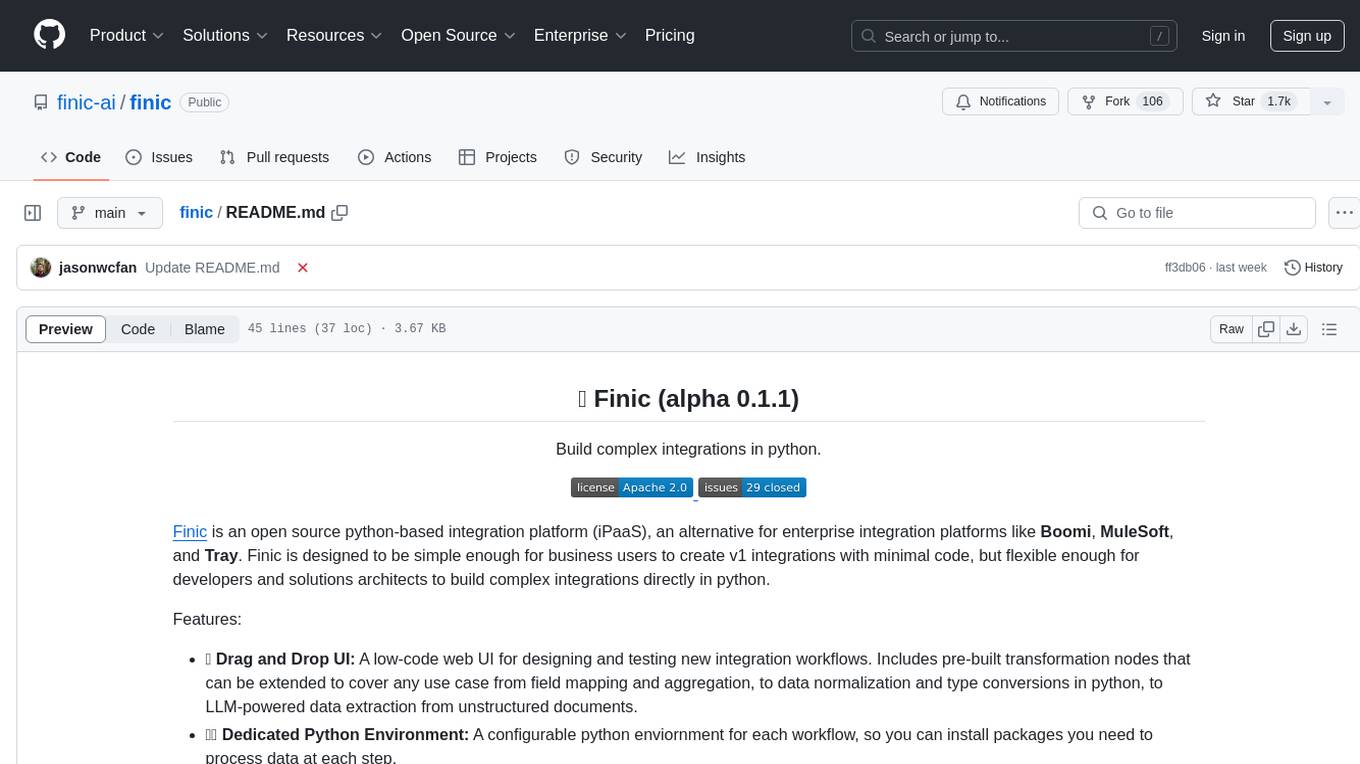
finic
Finic is an open source python-based integration platform designed for business users to create v1 integrations with minimal code, while also being flexible for developers to build complex integrations directly in python. It offers a low-code web UI, a dedicated Python environment for each workflow, and generative AI features. Finic decouples integration from product code, supports custom connectors, and is open source. It is not an ETL tool but focuses on integrating functionality between applications via APIs or SFTP, and it is not a workflow automation tool optimized for complex use cases.
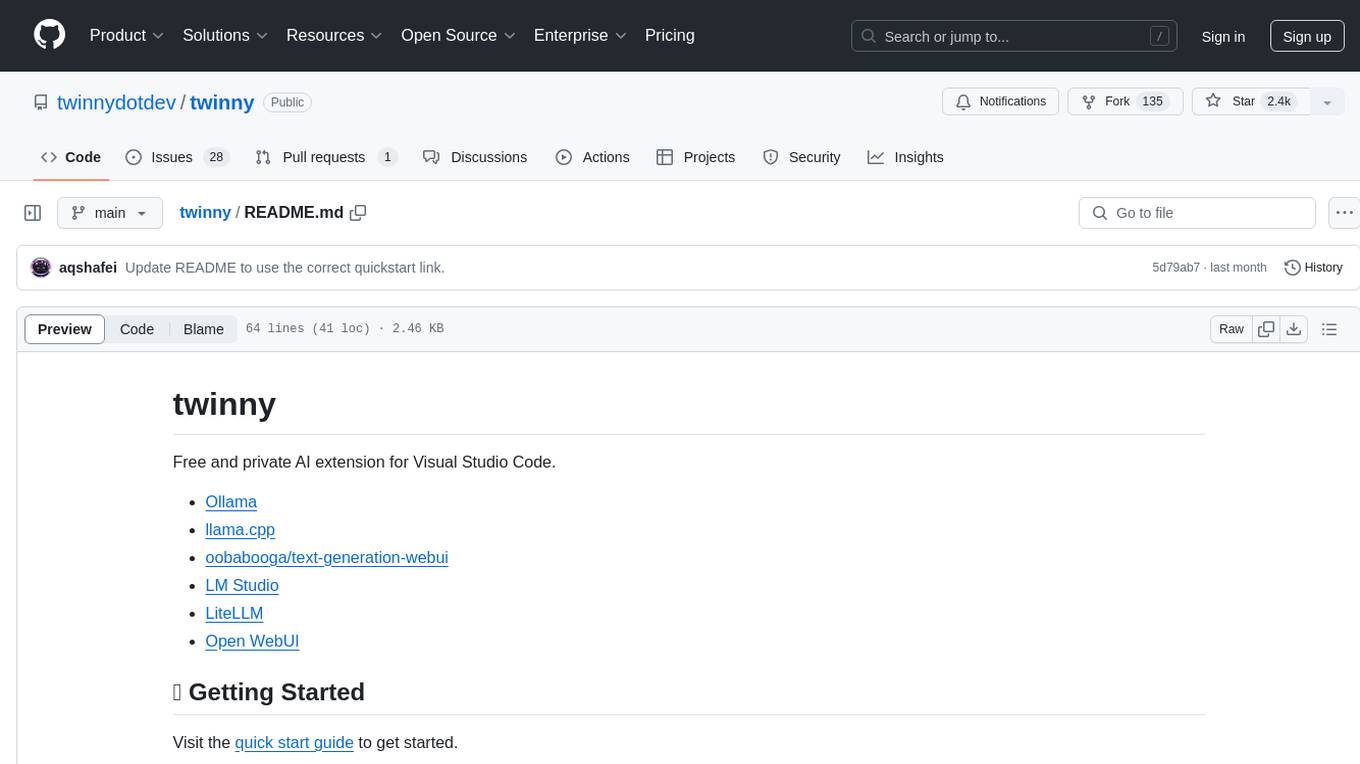
twinny
Twinny is a free and private AI extension for Visual Studio Code that offers AI-based code completion and code discussion features. It provides real-time code suggestions, function explanations, test generation, refactoring requests, and more. Twinny operates both online and offline, supports customizable API endpoints, conforms to OpenAI API standards, and offers various customization options for prompt templates, API providers, model names, and more. It is compatible with multiple APIs and allows users to accept code solutions directly in the editor, create new documents from code blocks, and copy generated code solution blocks. Twinny is open-source under the MIT license and welcomes contributions from the community.
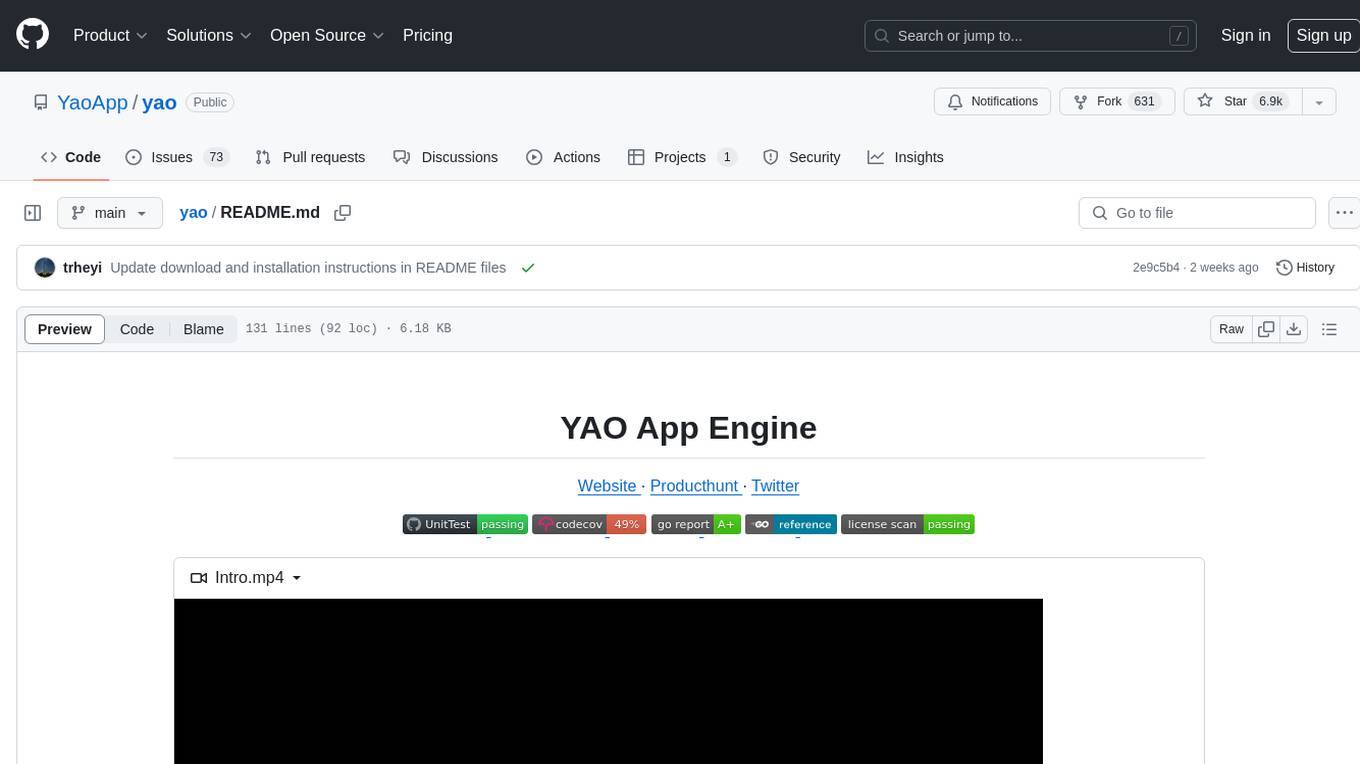
yao
YAO is an open-source application engine written in Golang, suitable for developing business systems, website/APP API, admin panel, and self-built low-code platforms. It adopts a flow-based programming model to implement functions by writing YAO DSL or using JavaScript. Yao allows developers to create web services by processes, creating a database model, writing API services, and describing dashboard interfaces just by JSON for web & hardware, and 10x productivity. It is based on the flow-based programming idea, developed in Go language, and supports multiple ways to expand the data stream processor. Yao has a built-in data management system, making it suitable for quickly making various management backgrounds, CRM, ERP, and other internal enterprise systems. It is highly versatile, efficient, and performs better than PHP, JAVA, and other languages.
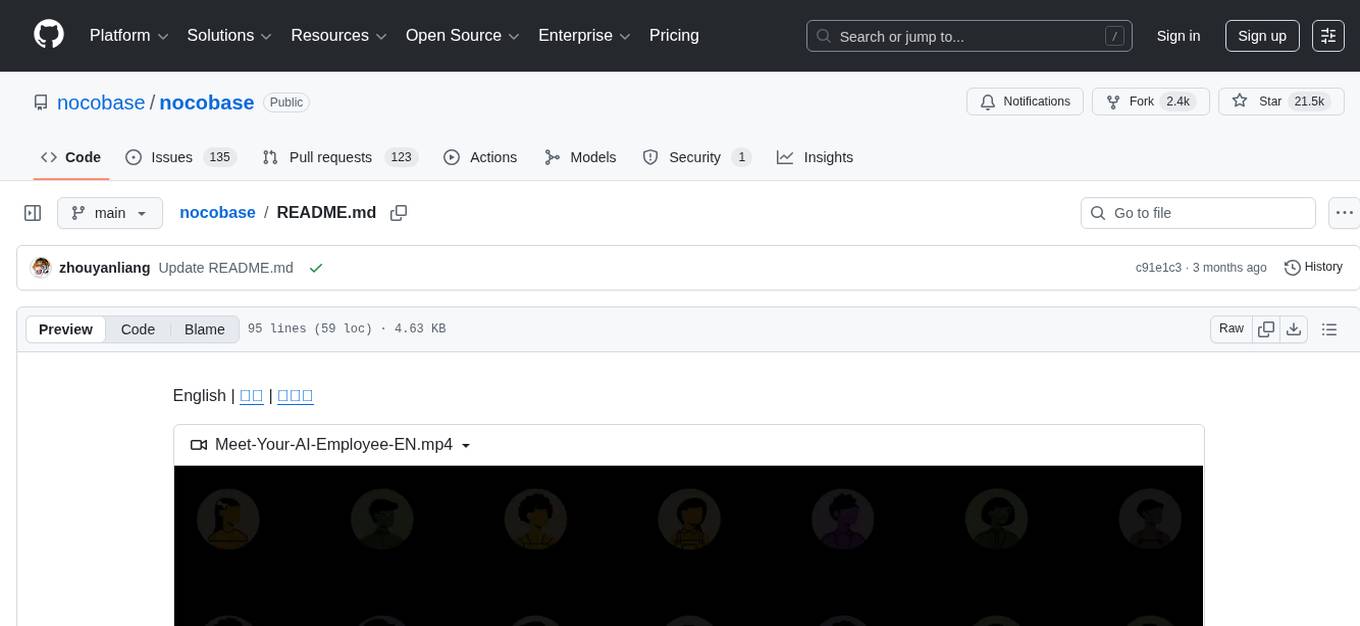
nocobase
NocoBase is an extensible AI-powered no-code platform that offers total control, infinite extensibility, and AI collaboration. It enables teams to adapt quickly and reduce costs without the need for years of development or wasted resources. With NocoBase, users can deploy the platform in minutes and have complete control over their projects. The platform is data model-driven, allowing for unlimited possibilities by decoupling UI and data structure. It integrates AI capabilities seamlessly into business systems, enabling roles such as translator, analyst, researcher, or assistant. NocoBase provides a simple and intuitive user experience with a 'what you see is what you get' approach. It is designed for extension through its plugin-based architecture, allowing users to customize and extend functionalities easily.

spring-ai-alibaba
Spring AI Alibaba is an AI application framework for Java developers that seamlessly integrates with Alibaba Cloud QWen LLM services and cloud-native infrastructures. It provides features like support for various AI models, high-level AI agent abstraction, function calling, and RAG support. The framework aims to simplify the development, evaluation, deployment, and observability of AI native Java applications. It offers open-source framework and ecosystem integrations to support features like prompt template management, event-driven AI applications, and more.

buildel
Buildel is an AI automation platform that empowers users to create versatile workflows without writing code. It supports multiple providers and interfaces, offers pre-built use cases, and allows users to bring their own API keys. Ideal for AI-powered document retrieval, conversational interfaces, and data integration. Users can get started at app.buildel.ai or run Buildel locally with Node.js, Elixir/Erlang, Docker, Git, and JQ installed. Join the community on Discord for support and discussions.
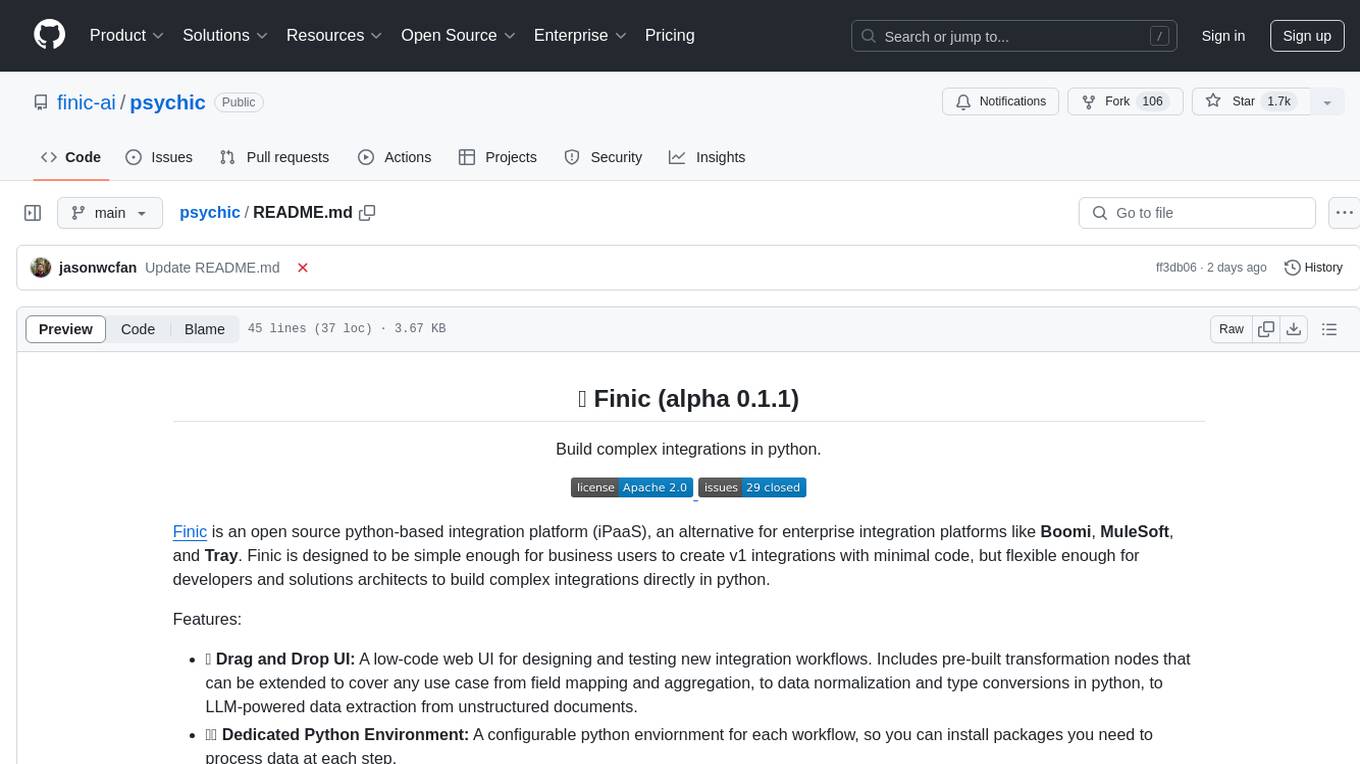
psychic
Finic is an open source python-based integration platform designed to simplify integration workflows for both business users and developers. It offers a drag-and-drop UI, a dedicated Python environment for each workflow, and generative AI features to streamline transformation tasks. With a focus on decoupling integration from product code, Finic aims to provide faster and more flexible integrations by supporting custom connectors. The tool is open source and allows deployment to users' own cloud environments with minimal legal friction.
For similar tasks

lollms-webui
LoLLMs WebUI (Lord of Large Language Multimodal Systems: One tool to rule them all) is a user-friendly interface to access and utilize various LLM (Large Language Models) and other AI models for a wide range of tasks. With over 500 AI expert conditionings across diverse domains and more than 2500 fine tuned models over multiple domains, LoLLMs WebUI provides an immediate resource for any problem, from car repair to coding assistance, legal matters, medical diagnosis, entertainment, and more. The easy-to-use UI with light and dark mode options, integration with GitHub repository, support for different personalities, and features like thumb up/down rating, copy, edit, and remove messages, local database storage, search, export, and delete multiple discussions, make LoLLMs WebUI a powerful and versatile tool.
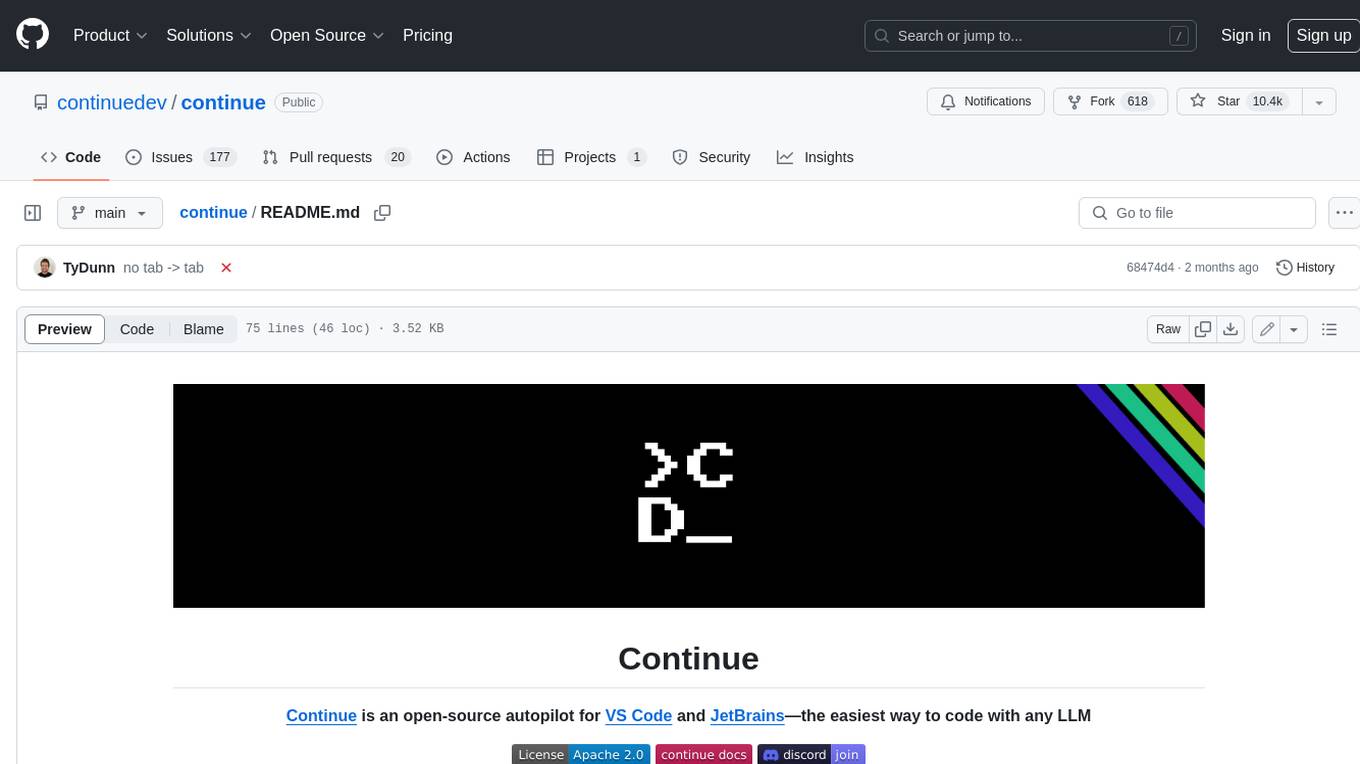
continue
Continue is an open-source autopilot for VS Code and JetBrains that allows you to code with any LLM. With Continue, you can ask coding questions, edit code in natural language, generate files from scratch, and more. Continue is easy to use and can help you save time and improve your coding skills.
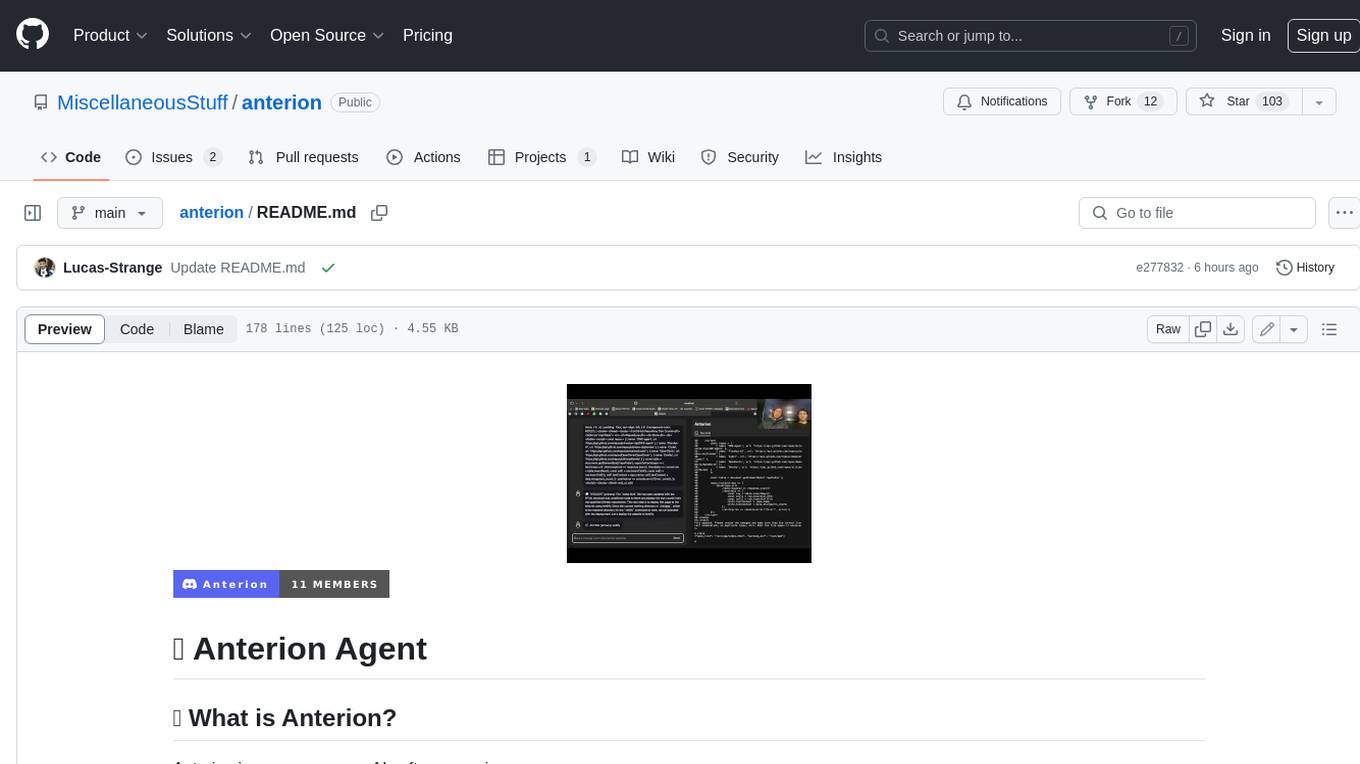
anterion
Anterion is an open-source AI software engineer that extends the capabilities of `SWE-agent` to plan and execute open-ended engineering tasks, with a frontend inspired by `OpenDevin`. It is designed to help users fix bugs and prototype ideas with ease. Anterion is equipped with easy deployment and a user-friendly interface, making it accessible to users of all skill levels.
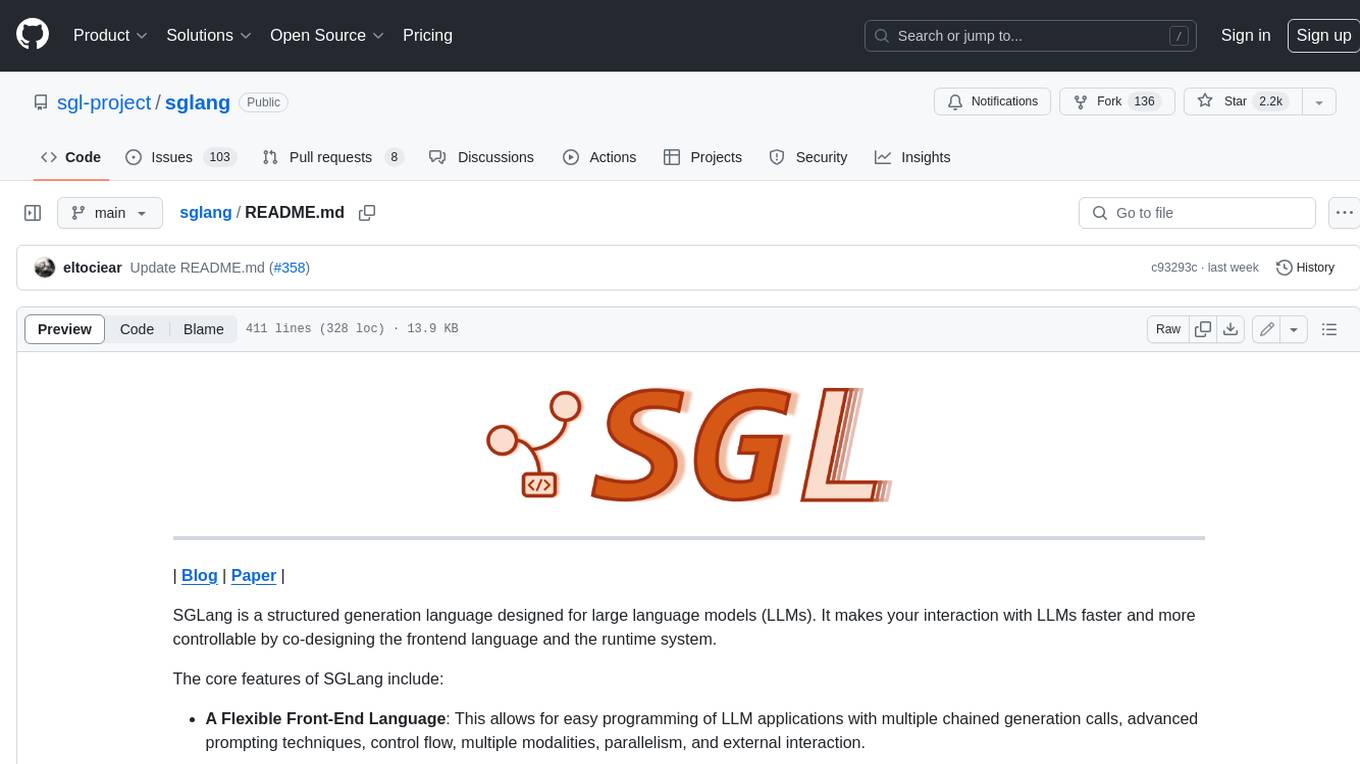
sglang
SGLang is a structured generation language designed for large language models (LLMs). It makes your interaction with LLMs faster and more controllable by co-designing the frontend language and the runtime system. The core features of SGLang include: - **A Flexible Front-End Language**: This allows for easy programming of LLM applications with multiple chained generation calls, advanced prompting techniques, control flow, multiple modalities, parallelism, and external interaction. - **A High-Performance Runtime with RadixAttention**: This feature significantly accelerates the execution of complex LLM programs by automatic KV cache reuse across multiple calls. It also supports other common techniques like continuous batching and tensor parallelism.
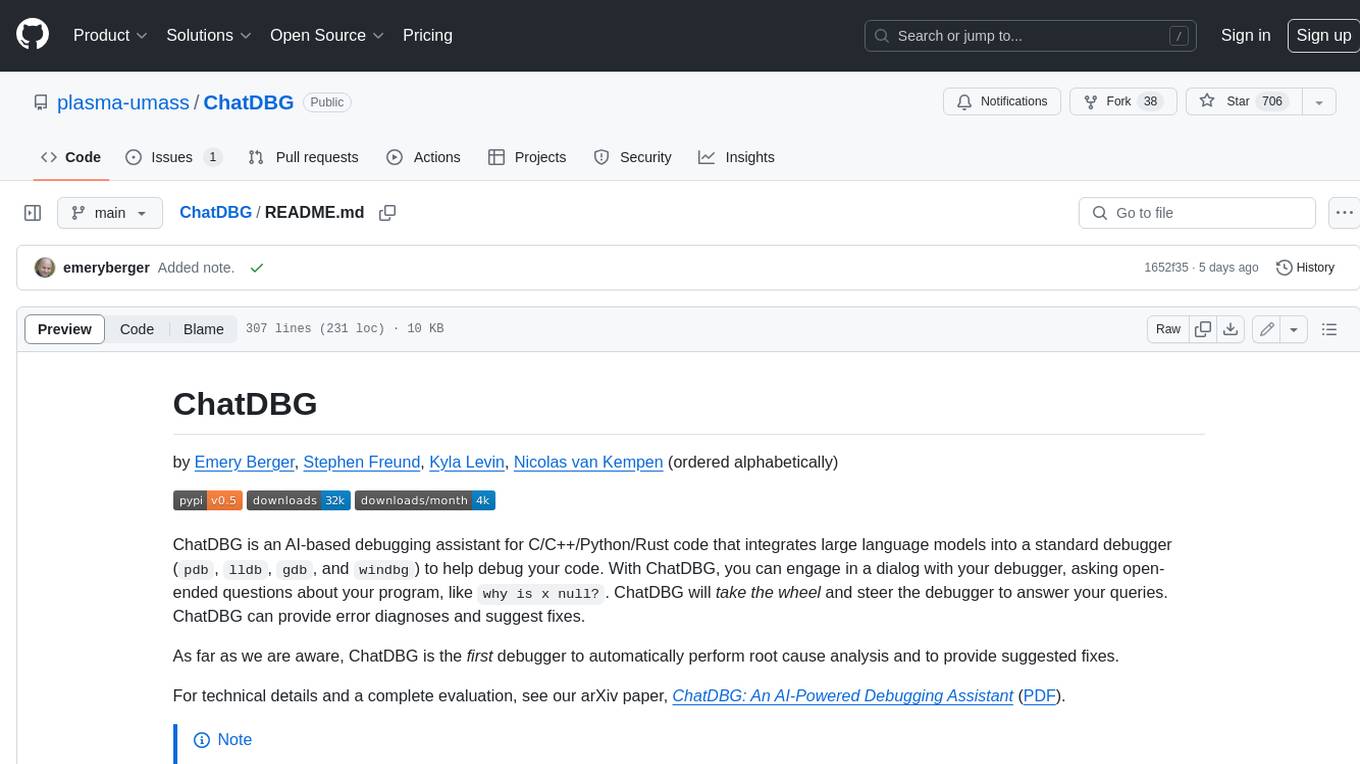
ChatDBG
ChatDBG is an AI-based debugging assistant for C/C++/Python/Rust code that integrates large language models into a standard debugger (`pdb`, `lldb`, `gdb`, and `windbg`) to help debug your code. With ChatDBG, you can engage in a dialog with your debugger, asking open-ended questions about your program, like `why is x null?`. ChatDBG will _take the wheel_ and steer the debugger to answer your queries. ChatDBG can provide error diagnoses and suggest fixes. As far as we are aware, ChatDBG is the _first_ debugger to automatically perform root cause analysis and to provide suggested fixes.
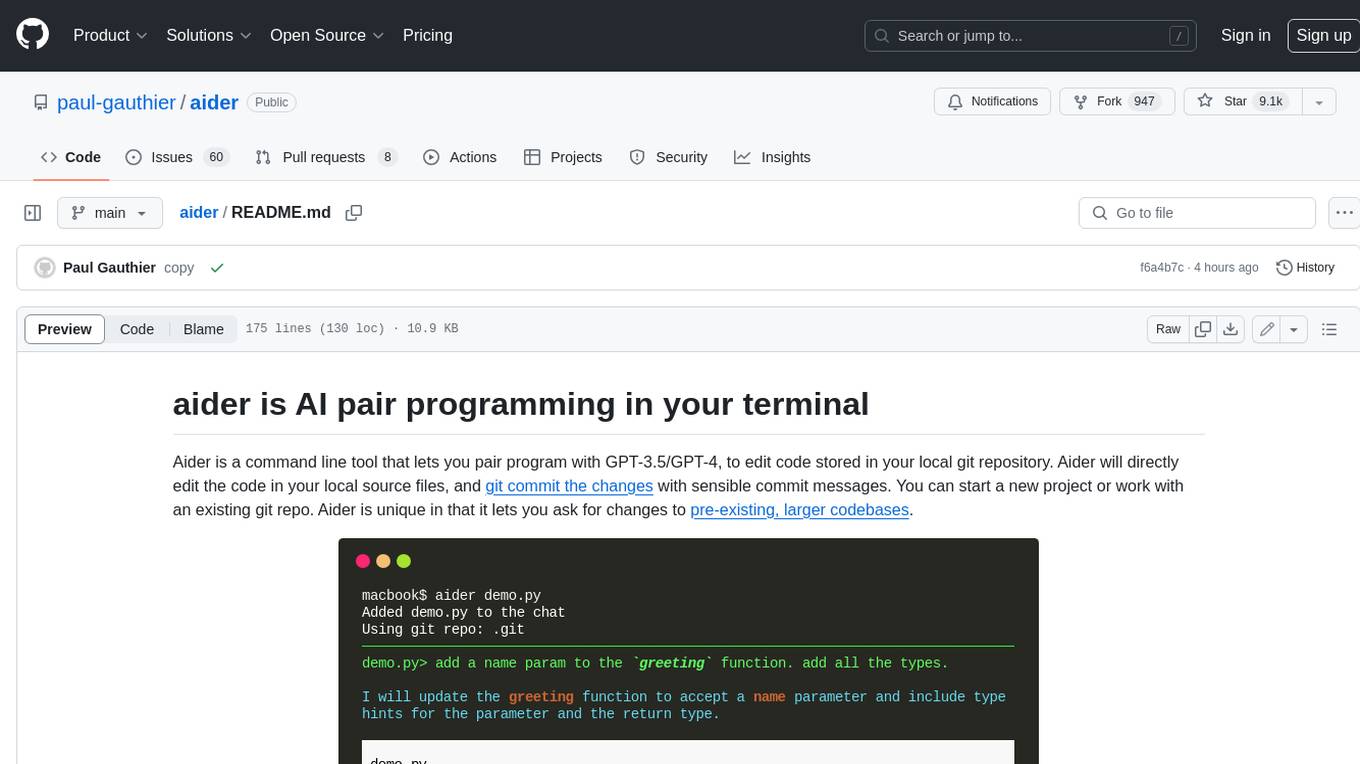
aider
Aider is a command-line tool that lets you pair program with GPT-3.5/GPT-4 to edit code stored in your local git repository. Aider will directly edit the code in your local source files and git commit the changes with sensible commit messages. You can start a new project or work with an existing git repo. Aider is unique in that it lets you ask for changes to pre-existing, larger codebases.
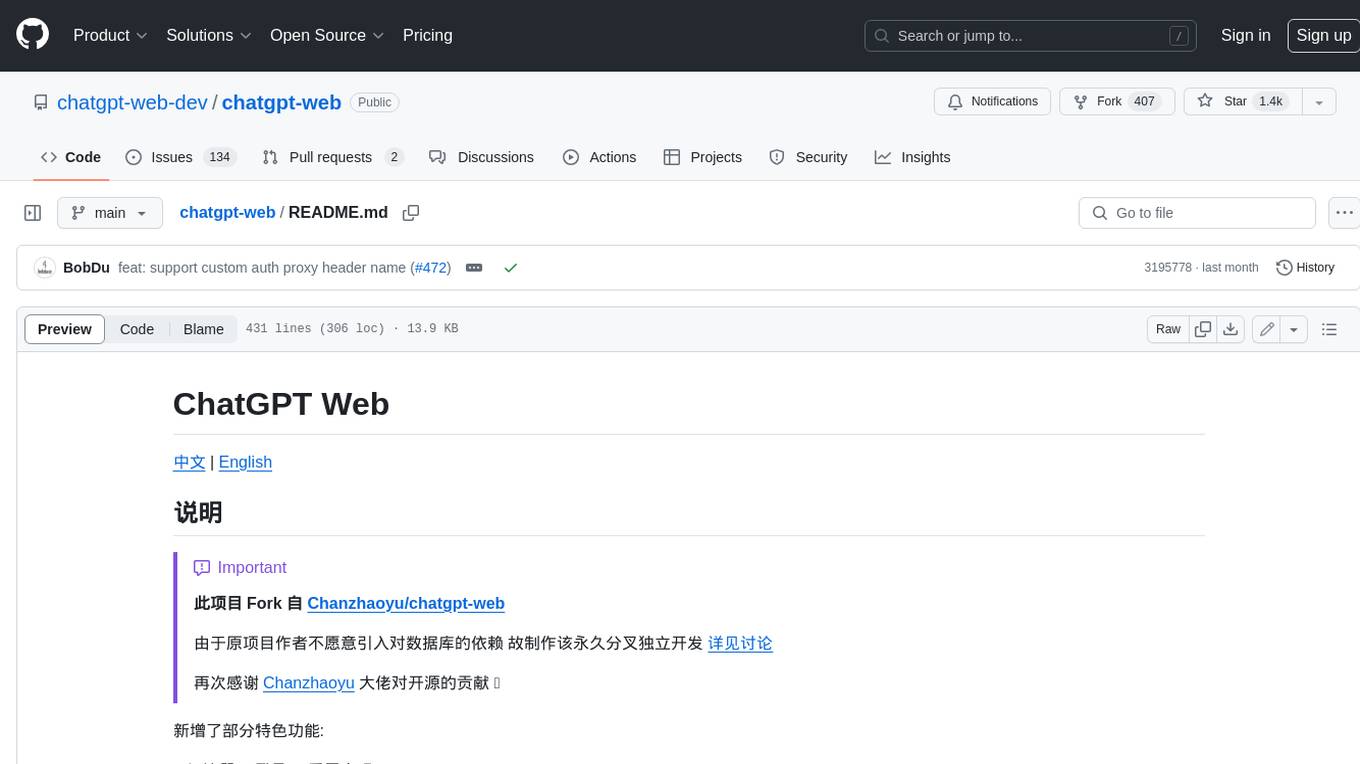
chatgpt-web
ChatGPT Web is a web application that provides access to the ChatGPT API. It offers two non-official methods to interact with ChatGPT: through the ChatGPTAPI (using the `gpt-3.5-turbo-0301` model) or through the ChatGPTUnofficialProxyAPI (using a web access token). The ChatGPTAPI method is more reliable but requires an OpenAI API key, while the ChatGPTUnofficialProxyAPI method is free but less reliable. The application includes features such as user registration and login, synchronization of conversation history, customization of API keys and sensitive words, and management of users and keys. It also provides a user interface for interacting with ChatGPT and supports multiple languages and themes.
For similar jobs

sweep
Sweep is an AI junior developer that turns bugs and feature requests into code changes. It automatically handles developer experience improvements like adding type hints and improving test coverage.

teams-ai
The Teams AI Library is a software development kit (SDK) that helps developers create bots that can interact with Teams and Microsoft 365 applications. It is built on top of the Bot Framework SDK and simplifies the process of developing bots that interact with Teams' artificial intelligence capabilities. The SDK is available for JavaScript/TypeScript, .NET, and Python.

ai-guide
This guide is dedicated to Large Language Models (LLMs) that you can run on your home computer. It assumes your PC is a lower-end, non-gaming setup.

classifai
Supercharge WordPress Content Workflows and Engagement with Artificial Intelligence. Tap into leading cloud-based services like OpenAI, Microsoft Azure AI, Google Gemini and IBM Watson to augment your WordPress-powered websites. Publish content faster while improving SEO performance and increasing audience engagement. ClassifAI integrates Artificial Intelligence and Machine Learning technologies to lighten your workload and eliminate tedious tasks, giving you more time to create original content that matters.

chatbot-ui
Chatbot UI is an open-source AI chat app that allows users to create and deploy their own AI chatbots. It is easy to use and can be customized to fit any need. Chatbot UI is perfect for businesses, developers, and anyone who wants to create a chatbot.

BricksLLM
BricksLLM is a cloud native AI gateway written in Go. Currently, it provides native support for OpenAI, Anthropic, Azure OpenAI and vLLM. BricksLLM aims to provide enterprise level infrastructure that can power any LLM production use cases. Here are some use cases for BricksLLM: * Set LLM usage limits for users on different pricing tiers * Track LLM usage on a per user and per organization basis * Block or redact requests containing PIIs * Improve LLM reliability with failovers, retries and caching * Distribute API keys with rate limits and cost limits for internal development/production use cases * Distribute API keys with rate limits and cost limits for students

uAgents
uAgents is a Python library developed by Fetch.ai that allows for the creation of autonomous AI agents. These agents can perform various tasks on a schedule or take action on various events. uAgents are easy to create and manage, and they are connected to a fast-growing network of other uAgents. They are also secure, with cryptographically secured messages and wallets.

griptape
Griptape is a modular Python framework for building AI-powered applications that securely connect to your enterprise data and APIs. It offers developers the ability to maintain control and flexibility at every step. Griptape's core components include Structures (Agents, Pipelines, and Workflows), Tasks, Tools, Memory (Conversation Memory, Task Memory, and Meta Memory), Drivers (Prompt and Embedding Drivers, Vector Store Drivers, Image Generation Drivers, Image Query Drivers, SQL Drivers, Web Scraper Drivers, and Conversation Memory Drivers), Engines (Query Engines, Extraction Engines, Summary Engines, Image Generation Engines, and Image Query Engines), and additional components (Rulesets, Loaders, Artifacts, Chunkers, and Tokenizers). Griptape enables developers to create AI-powered applications with ease and efficiency.
